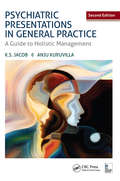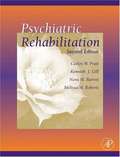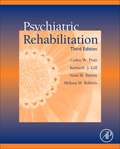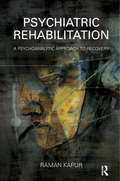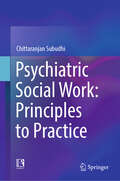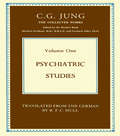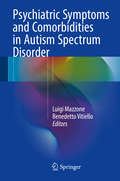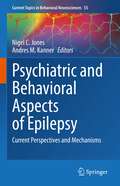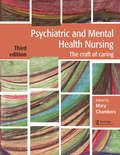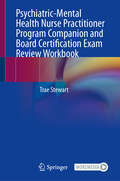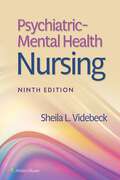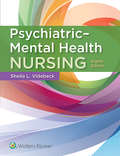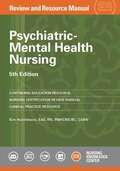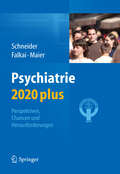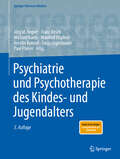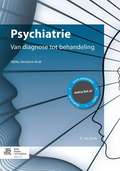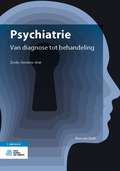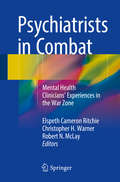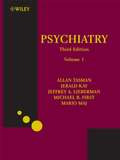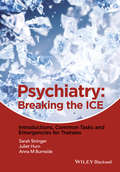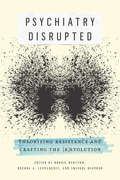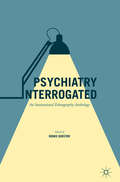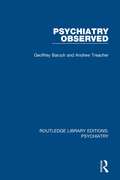- Table View
- List View
Psychiatric Presentations in General Practice: A Guide to Holistic Management, Second Edition
by K. S. Jacob Anju KuruvillaMedical schools currently use specialist perspectives on psychiatric disorders to train physicians, nurses and health professionals. This results in a lack confidence among non-psychiatric health professionals, which reduces their ability to manage common mental health conditions in primary care and secondary hospitals. This book is a practical guide to common mental health conditions encountered in general medical practice.
Psychiatric Rehabilitation (2nd edition)
by Carlos W. Pratt Kenneth J. Gill Nora M. Barrett Melissa M. RobertsPsychiatric rehabilitation refers to community treatment of people with mental disorders. Community treatment has recently become far more widespread due to deinstitutionalization at government facilities.
Psychiatric Rehabilitation 3rd Edition
by Carlos W. Pratt Kenneth J. Gill Nora M. Barrett Melissa M. RobertsThe third edition of Psychiatric Rehabilitation, discusses interventions to help individuals with mental illness improve the quality of their life, achieve goals, and increase opportunities for community integration.
Psychiatric Rehabilitation: A Psychoanalytic Approach to Recovery
by Raman KapurRecovering from severe mental illness is one of the most terrifying human experiences in health care. Often conventional rehabilitation approaches focus on helping the patient with his or her symptoms and maximising the external world through supportive interventions. However, often little attention is paid to the internal world of the patient. This subjective experience of recovery is the focus of this book. It describes a particular psychoanalytic model that best captures this distressful state of mind and suggests particular processes that have to be put in place to ensure the patient gets the best opportunity to have his or her fears and hopes addressed. The book also addresses "real world" issues such as management, leadership and training, as well as highlighting key research findings from relevant studies. Outcome measures are suggested that could be adopted to measure the benefits of this particular approach. The chapters give many clinical, organisational and research descriptions from the real world of psychiatry and social care.
Psychiatric Social Work: Principles to Practice
by Chittaranjan SubudhiThis textbook, Psychiatric Social Work: Principles to Practice, provides a comprehensive foundation for understanding social work’s generalist practice in mental health care. It synthesizes historical and contemporary perspectives into a structured sequence. It addresses key topics such as mental health as a global issue, the importance of psychiatric social work, classifications and assessment of mental disorders and theoretical approaches. It also focuses on models and strategies used in psycho-social rehabilitation, community mental health, and therapeutic communities. Chapter-end questions enhance understanding, while the text combines fresh research with evidence-based practice to promote inclusive development for people with mental illness. The book is an essential read for scholars, educators, researchers, field practitioners, and students of social work, psychiatric nursing, public health, health psychology, and community medicine. It is also invaluable for public health institutions, paramedical staff, health workers, policymakers, and advocacy groups.
Psychiatric Studies: Experiments In The Diagnosis Of Psychopathological Conditions Carried Out At The Psychiatric Clinic Of The University Of Zurich (classic Reprint) (Collected Works of C.G. Jung #No. 20)
by C.G. JungAt the turn of the last century C.G. Jung began his career as a psychiatrist. During the next decade, three men whose names are famous in the annals of medical psychology influenced his professional development: Pierre Janet, under whom he studied at the Sappetriere Hospital in Paris; Eugen Bleuler, his chief at the Burgholzli Mental Hospital in Zurick; and Sigmund Frued, whom Jung met in 1907. It is Bleuler, and to a lesser extent Janet, whose influence is to be found in the descriptive experimental psychiatry composing Volume I of the Collected Works. These papers appeared between 1902 and 1905l most of them are now being published in English for the first time. The volume opens with Jung's dissertation for the medical degree: 'On the Psychology and Pathology of So-Called Occult Phenomena', a study that foreshadows much of his later work, and as such is indispensable to all serious students of his work. It is the detailed analysis of the case of an hysterical adolescent girl who professed to be a medium. The volume also includes papers on cryptomnesia, hysterical parapraxes in reading, manic mood disorder, simulated insanity, and other subjects.
Psychiatric Symptoms and Comorbidities in Autism Spectrum Disorder
by Luigi Mazzone Benedetto VitielloThis book explains in detail the diagnosis, management, and treatment of comorbid disorders in patients with autism spectrum disorders (ASD). Important insights are provided into the nature of the symptoms of psychiatric comorbidities in these patients, and particularly children and adolescents, with a view to assisting clinicians in reaching a correct diagnosis that will permit the implementation of appropriate treatment strategies, whether psychological or pharmacological. The full range of potential comorbidities is considered, including mood disorders, anxiety disorders, obsessive-compulsive disorder, schizophrenia spectrum and other psychotic disorders, eating disorders, disruptive behavioral disorders, Tourette's disorder, and substance-related disorders. In each case guidance is provided on how to avoid incorrectly attributing symptoms to ASD and on treatment options. Psychiatric Comorbidities in Autism Spectrum Disorders will be of value to all practitioners who are confronted by patients with these complex co-occurring conditions.
Psychiatric and Behavioral Aspects of Epilepsy: Current Perspectives and Mechanisms (Current Topics in Behavioral Neurosciences #55)
by Andres M. Kanner Nigel C. JonesMany people living with epilepsy also suffer from debilitating psychiatric and cognitive disorders. While these comorbidities have been recognized for centuries, their causation, and relationship to the epilepsy remains clouded in mystery. This volume highlights recent knowledge and findings as well as controversies in our current understanding of behavioral and psychiatric comorbidities of epilepsy.
Psychiatric and Mental Health Nursing: The craft of caring
by Mary ChambersThis new edition of a bestselling, evidence-based textbook provides a comprehensive overview of psychiatric and mental health nursing. Keeping service users and their recovery at the centre of care, the holistic approach will help nurses to gain the tools and understanding required to work in this complex area. Extensively updated for this new edition, the text looks at: Aspects of mental health nursing: covering topics such as ethics, developing therapeutic relationships and supervision. The foundations of mental health nursing: discussing diagnosis, assessment and risk. Caring for those experiencing mental health distress: looking at wide range of troubles including anxiety, bipolar disorder, eating disorders and issues around sexuality and gender. Care planning and approaches to therapeutic practice: exploring ideas, pathways and treatments such as recovery, CBT, psychodynamic therapies and psychopharmacology. Services and support for those with mental health distress: covering topics such as collaborative work, involvement of service users and their families and carers, and a range of different mental healthcare settings. Mental health nursing in the twenty-first century: highlighting emerging and future trends including the political landscape, physical health and health promotion, and technological advances. This accessible and comprehensive textbook integrates service user perspectives throughout and includes student-friendly features such as learning outcomes, key points summaries, reflection points and further reading sections. It is an essential resource for all mental health nursing students, as well as an invaluable reference for practising nurses.
Psychiatric-Mental Health Nurse Practitioner Program Companion and Board Certification Exam Review Workbook
by Trae StewartEvery year, nearly 5,000 US psychiatric-mental health nurse practitioners (PMHNP) sit for the ANCC board exam. Upon passing, PMHNPs become board-certified and eligible for licensure in their respective states, as well as eligible to apply for a DEA license to write prescriptions. However, the extensive content covered on the board exam often exceeds what is taught in Master's of Science in Nursing programs tailored for PMHNPs. Suitable for both PMHNP students and advanced nurses preparing for board certification, this PMHNP Program Companion and Review Workbook serve as a comprehensive guide from Day 1 of the PMHNP program through exam preparation. The book is structured logically, progressing from fundamental nursing topics (e.g., lab values, ethics, public health) to psychiatric-mental health specific content (e.g., assessment and diagnosis, major psychiatric disorders, psychopharmacology, therapeutic modalities). Additionally, it covers essential advanced practice nursing areas like leadership, quality improvement, and biostatistics. What sets this workbook apart is its interactive approach to learning. Through charts, tables, fill-in-the-blanks, matching exercises, and mnemonics, learners actively engage with the material. Answers and explanations are provided for all practice activities, ensuring comprehension and retention. Moreover, the accompanying Springer Nature Flashcard app offers almost 2,000 practice test questions, allowing learners to access study material conveniently on-the-go via their phone, tablet, or computer. It's an engaging and effective method to reinforce learning. The PMHNP Program Companion and Review Workbook is an invaluable resource for anyone pursuing excellence in psychiatric-mental health nursing practice. Test your knowledge with questions and answers about the book in the Springer Nature Flashcards app.
Psychiatric-Mental Health Nursing
by Sheila L. VidebeckPresenting a practical, student-friendly approach to essential skills and concepts, Psychiatric–Mental Health Nursing, 9th Edition, helps students confidently build a foundation for successful practice. Short chapters and a succinct, straightforward writing style make challenging concepts accessible, and entertaining cartoons and built-in study guide tools engage students while reinforcing their understanding. This thoroughly updated edition reflects the latest evidence-based information and an enhanced focus on clinical judgment to help students master specific nursing interventions, hone their therapeutic communication skills, and effectively apply concepts in any care setting.
Psychiatric-Mental Health Nursing (Coursepoint Ser.)
by Shelia VidebeckA Practical Focus on the Skills and Concepts Essential to Your Success With an accessible, clear and student-friendly approach, Psychiatric-Mental Health Nursing clarifies challenging concepts and helps you build a foundation for working successfully with clients experiencing mental health challenges regardless of care setting. The text explores the full spectrum of psychiatric nursing, helping you master specific nursing interventions, hone your therapeutic communication skills and learn to apply content effectively within the framework of the nursing process. New! Unfolding Patient Stories written by the National League for Nursing put the nursing process in a realistic context to prepare you for successful client interactions and interventions. Clinical Vignettes familiarize you with the features of major disorders you are likely to encounter in practice. Therapeutic Dialogues help you perfect your communication skills with specific examples of nurse-client interactions. Best Practice boxes provide the latest evidence-based findings in psychiatric nursing. Self-Awareness features foster your personal and professional development through self-reflection. Concept Mastery Alerts clarify important concepts essential to your classroom and clinical success. Watch and Learn icons point you to corresponding true-to-life Lippincott® Theory to Practice Video Series videos for a richer understanding of important mental health disorders. Built-In Study Guide reinforces your understanding with multiple-choice questions, multiple-response questions and clinical examples at the end of each chapter. Nursing Care Plans demonstrate effective approaches for addressing specific client disorders. Drug Alerts highlight essential concerns related to psychotropic drugs. Warning boxes alert you to FDA considerations for specific medications. Cultural Considerations help you ensure culturally sensitive care for a wide range of client populations. Elder Considerations sections prepare you to care for the growing population of older adults. Client/Family Education boxes boost your teaching capabilities. Nursing Interventions etail key treatment strategies for specific disorders. DSM-5 Diagnostic Criteria boxes summarize the medical diagnostic features of specific disorders.
Psychiatric-mental Health Nursing Review And Resource Manual, 5th Ed
by Kim HutchinsonAre you looking into how to advance your professional development through certification? Need a reliable and credible reference resource? No matter where you are in the process, make sure you have the most valuable review and resource tool at your disposal. The Nursing Knowledge Center’s Psychiatric-Mental Health Nursing Review and Resource Manual is a must-have tool for nurses planning to take the American Nurses Credentialing Center’s (ANCC’s) Psychiatric-Mental Health Nursing certification exam. Based on the official ANCC certification exam test content outline, this review and resource manual will help you: -Study and analyze comprehensive material and concepts written by nursing experts. -Develop a recommended seven-step plan to equip you for the exam and map out what to do on the day of the exam. -Prepare for and familiarize yourself with psychiatric-mental health nursing standards of practice. -And much more ... Make the Psychiatric-Mental Health Nursing Review and Resource Manual a key resource in your certification preparation.
Psychiatrie 2020 plus
by Peter Falkai Frank SchneiderUnter den medizinischen Disziplinen hat die Psychiatrie und Psychotherapie die größte Zukunft: In den letzten Jahrzehnten hat das Fach in Forschung und Versorgung Quantensprünge durchlaufen. Diese Entwicklung setzt sich fort. Herausforderungen sind die weitere Erforschung und der zunehmende Behandlungsbedarf im Bereich psychischer Erkrankungen. In dem Buch "Psychiatrie 2020" skizziert die Deutsche Gesellschaft für Psychiatrie, Psychotherapie und Nervenheilkunde (DGPPN) neben einer Übersicht über die Entwicklung des Faches eine Vision für das Jahr 2020. Psychiatrie 2020 plus, ist nun die erweiterte und aktualisierte Auflage der Bestandsaufnahme und Vision für das Jahr 2020.
Psychiatrie und Psychotherapie des Kindes- und Jugendalters (Springer Reference Medizin)
by Franz Resch Jörg M. Fegert Tanja Legenbauer Manfred Döpfner Michael Kaess Kerstin Konrad Paul PlenerKinder- und Jugendpsychiatrie und Psychotherapie und Kinder- und Jugendlichenpsychotherapie haben in den letzten Jahren in der Forschung und Versorgung eine enorme Entwicklung gemacht. Durch die Einführung des Grundständigen Psychotherapiestudiums und der damit verbundenen Einführung einer fachspezifischen Weiterbildung in Kinder- und Jugendpsychotherapie, wird es zukünftig zwei heilberufliche Weiterbildungsgänge im Bereich der psychischen Gesundheit von Kindern und Jugendlichen geben. Die Neuauflage der Kinder- und Jugendpsychiatrie und Psychotherapie mit zahlreichen neuen Themen und fast komplett neuen Texten, spiegelt diese Entwicklung wider. Hierfür wurde das Herausgeberboard und das Autorenteam deutlich erweitert. Ausgewiesene Kinder- und Jugendlichenpsychotherapeutinnen und Psychotherapeuten sind gleichberechtigte Mitherausgeber. Insofern steht das Buch in der Tradition des Springer-Referenzlehrbuchs, ist aber dennoch weit mehr als eine dritte Auflage der Kinder- und Jugendpsychiatrie und Psychotherapie, denn hier wird kooperativ und interdisziplinär das Fachgebiet der Psychiatrie und Psychotherapie des Kindes- und Jugendalters präsentiert. Die Fülle an Information und Wissen ist ein unerlässliches Werkzeug für die tägliche Arbeit von Assistenzärzt*innen, Fachärzt*innen, Assistenzpsychotherapeut*innen in Fachweiterbildung Kinder- und Jugendpsychotherapie, Kinder- und Jugendlichenpsychotherapeut*innen in Ausbildung, Psychotherapeut*innen und Psycholog*innen und Sozialarbeiter*innen, auch in angrenzenden Fachgebieten. Das Buch beschreibt Schulen übergreifend die am besten geeigneten Therapieverfahren und bietet einen evidenzbasierten Handlungsleitfaden für alle, die in ihrem beruflichen Leben mit Kindern und Jugendlichen mit psychischen Störungen zu tun haben. Bedingt durch diese inhaltliche Ausweitung und angesichts der Fülle neuen Wissens, wurde zwar die klare Struktur und didaktische Aufbereitung im Lehrbuch beibehalten, gleichzeitig wurde das Buch in zwei Teile aufgeteilt. Ein allgemeiner Teil und ein spezieller störungsspezifischer Teil wird in zwei Bänden präsentiert, die durch die gleiche Struktur und didaktische Merkmale alle Leser*innen bei der Orientierung im Text unterstützen.
Psychiatrie: Van diagnose tot behandeling
by R. van DethPsychiatrieVan diagnose tot behandelingDit boek geeft een overzicht van de moderne psychiatrie in al haar facetten. Het eerste deel beschrijft de wetenschappelijke principes en methoden van de psychiatrie. Daarbij wordt op evenwichtige wijze aandacht geschonken aan biologische, psychologische en sociale invalshoeken. In het tweede deel staan de voornaamste psychische stoornissen centraal. Aan de hand van praktijkvoorbeelden komen daarvan telkens de essentiële kenmerken, verklaringen en behandelvormen aan bod.Het boek probeert jargon zoveel mogelijk te vermijden en is in heldere taal geschreven. Het is dan ook bedoeld voor iedereen die op een snelle en toegankelijke manier kennis wil maken met het psychiatrisch werkveld. Dat kunnen studenten zijn of geïnteresseerde leken, maar ook mensen met psychische problemen en hun directe omgeving. Verder is het boek heel geschikt voor wie beroepshalve met de wereld van de psychiatrie te maken krijgt: zorgprofessionals, maatschappelijk werkers en personeelsmanagers, maar ook degenen die werken bij politie en justitie of in het onderwijs. Mede op basis van de DSM-5 is deze vijfde herziene editie in veel opzichten geactualiseerd. Daarnaast biedt nu ook een website ondersteunende (internet)bronnen bij ieder hoofdstuk. Drs. Ron van Deth is psycholoog en publicist en verbonden aan het Europees Instituut voor Educatie in Driebergen.
Psychiatrie: Van diagnose tot behandeling
by Ron van DethDit boek biedt een toegankelijk overzicht van alle facetten van de moderne psychiatrie: van diagnose tot behandeling. Daarbij wordt nadrukkelijk ingegaan op innovatieve bewegingen in de Nederlandse GGZ, zoals eigen regie, herstel, gezamenlijke besluitvorming, zelfmanagement en ervaringsdeskundigheid. Het boek is gericht op iedereen die in zijn werk of studie te maken krijgt met psychische problematiek.De zesde druk van Psychiatrie: Van diagnose tot behandeling is inhoudelijk verbeterd, geactualiseerd en uitgebreid, waardoor het completer is geworden. De nieuwe opmaak met tal van illustraties maakt het boek aantrekkelijker en overzichtelijker. In ieder hoofdstuk is een studieblok opgenomen met samenvattingen, kernbegrippen en doelen. Ook biedt deze editie studenten ruime mogelijkheden om hun kennis en inzicht te oefenen en te toetsen met flashcards én 260 multiplechoicevragen. De uitgebreide website bij dit boek heeft behalve links naar video’s, films, websites en boeken, ook videoclips die belangrijke aspecten van de hoofdstukken toelichten. Door deze toevoegingen offline en online is het boek uitermate geschikt als studiemateriaal.Een ander belangrijk nieuw element zijn de psycho-educatieve teksten. Deze maken duidelijk wat zorgprofessionals te bieden hebben, maar vooral wat cliënten en hun directe omgeving zélf kunnen doen. Hiermee richt het boek zich ook op mensen met psychische problematiek.Psychiatrie: Van diagnose tot behandeling is geschreven door drs. Ron van Deth. Hij is psycholoog en publicist en verbonden aan het Europees Instituut voor Educatie in Driebergen. Hij was jarenlang eindredacteur van PsychoPraktijk en schreef onder andere Psychotherapie: Van theorie tot praktijk, Inleiding in de psychopathologie en (als co-auteur) Pedagogische adviezen voor speciale kinderen.
Psychiatrists in Combat
by Elspeth Cameron Ritchie Christopher H. Warner Robert N. MclayThis book tells the professional and personal experiences of American military psychiatrists and their colleagues in the longest conflict in American history. These highly trained men and women treat service members for the psychological consequences from their experiences in battle, including killing enemy combatants; seeing wounded and killed civilian casualties; losing their friends in combat; factoring in personal mental health needs, including psychiatric drug treatment; and potentially dealing with their own physical injuries from being shot or blown up. The volume consists of 20 short first-person case studies from the mental health providers who have been risking their lives while treating patients in the battlefield since 9/11. Written by expert psychiatrists who have experienced these challenges directly, this texts offers both a clinical and personal account that is not found anywhere else. Topics include tips on providing psychotherapy in battle, evaluating and treating detainees in war prisons such as Abu Ghraib and Guantanamo Bay, and the unique challenges of prescribing medication to patients who are also comrades in war. Psychiatrists in Combat is uniquely positioned to be a valuable resource for psychiatrists interested in trauma and veterans, psychologists, social workers, occupational therapists, military health personnel, and mental health professionals interested in military psychiatry.
Psychiatry
by Michael B. First Jeffrey A. Lieberman Mario Maj Allan Tasman Jerald KayExtensively revised and updated this edition reflects the progress and developments in the field. With 127 chapters and over 400 contributors this book is a truly comprehensive exposition of the specialty of psychiatry.Written by well-known and highly regarded experts from around the world, it takes a patient-centered approach making it an indispensable resource for all those involved in the care of patients with psychiatric disorders.For this new edition, the section on the Neuroscientific Foundations of Psychiatry has been completely revised, with a new author team recruited by Section Editors Jonathan Polan and Eric Kandel. The final section, Special Populations and Clinical Settings, features important new chapters on today's most urgent topics, including the homeless, restraint and geriatric psychiatry.Key features include:Coverage of the entire field of psychiatry, from psychoanalysis to pharmacology and brain imaging, including family relations, cultural influence and change, epidemiology, genetics and behavioral medicineClinical vignettes describing current clinical practice in an attractive designNumerous figures and tables that facilitate learning and comprehension appear throughout the textClear comparisons of the DSM-IV-TR and ICD-10 criteria for easy understanding in a global contextDiagnostic and treatment decision trees to help both the novice and experienced readerThe chapter on Cognitive Behavioral Therapies by Edward Friedman, Michael Thase and Jesse Wright is freely available. Please click on Read Excerpt 2 above to read this superb exposition of these important therapies.
Psychiatry
by Sarah L. Stringer Anna M. Burnside Juliet HurnPsychiatry: Breaking the ICE contains everything psychiatry trainees need in order feel confident and competent in general adult inpatient and community placements. A practical and reassuring guide to life as a psychiatrist, structured around the tasks expected both in day-to-day practice and in out-of-hours work Key themes running throughout the book include ethical and legal issues, risk assessment and management, patient experience and safe prescribing The authors are closely involved in the training, mentoring and supervision of core trainees, and know the real-world challenges faced by junior psychiatrists
Psychiatry Disrupted
by Shaindl Diamond Bonnie Burstow Brenda A. LefrançoisThere is growing international resistance to the oppressiveness of psychiatry. While previous studies have critiqued psychiatry, Psychiatry Disrupted goes beyond theorizing what is wrong with it to theorizing how we might stop it. Introducing readers to the arguments and rationale for opposing psychiatry, the book combines perspectives from anti-psychiatry and critical psychiatry activism, mad activism, antiracist, critical, and radical disability studies, as well as feminist, Marxist, and anarchist thought. The editors and contributors are activists and academics - adult education and social work professors, psychologists, prominent leaders in the psychiatric survivor movement, and artists - from across Canada, England, and the United States. From chapters discussing feminist opposition to the medicalization of human experience, to the links between psychiatry and neo-liberalism, to internal tensions within the various movements and different identities from which people organize, the collection theorizes psychiatry while contributing to a range of scholarship and presenting a comprehensive overview of resistance to psychiatry in the academy and in the community. Contributors include Simon Adam (University of Toronto), Rosemary Barnes University of Toronto, Peter Beresford (Brunel University), Bonnie Burstow (University of Toronto), Chris Chapman (York University), Mark Cresswell (Durham University), Shaindl Diamond (York University), Chava Finkler (Memorial University), Ambrose Kirby (therapist in private practice, Brenda A. LeFrançois (Memorial University of Newfoundland), Mick McKeown (University of Central Lancashire), Robert Menzies (Simon Fraser University), China Mills (Oxford University), Tina Minkowitz (World Network of Users and Survivors of Psychiatry), Ian Parker (University of Leicester), Susan Schellenberg, Helen Spandler (University of Central Lancashire), and AJ Withers (York University). A courageous anthology, Psychiatry Disrupted is a timely work that asks compelling activist questions that no other book in the field touches.
Psychiatry Disrupted: Theorizing Resistance and Crafting the (R)evolution
by Shaindl Diamond Bonnie Burstow Brenda A. LeFrançoisThere is growing international resistance to the oppressiveness of psychiatry. While previous studies have critiqued psychiatry, Psychiatry Disrupted goes beyond theorizing what is wrong with it to theorizing how we might stop it. Introducing readers to the arguments and rationale for opposing psychiatry, the book combines perspectives from anti-psychiatry and critical psychiatry activism, mad activism, antiracist, critical, and radical disability studies, as well as feminist, Marxist, and anarchist thought. The editors and contributors are activists and academics - adult education and social work professors, psychologists, prominent leaders in the psychiatric survivor movement, and artists - from across Canada, England, and the United States. From chapters discussing feminist opposition to the medicalization of human experience, to the links between psychiatry and neo-liberalism, to internal tensions within the various movements and different identities from which people organize, the collection theorizes psychiatry while contributing to a range of scholarship and presenting a comprehensive overview of resistance to psychiatry in the academy and in the community. Contributors include Simon Adam (University of Toronto), Rosemary Barnes University of Toronto, Peter Beresford (Brunel University), Bonnie Burstow (University of Toronto), Chris Chapman (York University), Mark Cresswell (Durham University), Shaindl Diamond (York University), Chava Finkler (Memorial University), Ambrose Kirby (therapist in private practice, Brenda A. LeFrançois (Memorial University of Newfoundland), Mick McKeown (University of Central Lancashire), Robert Menzies (Simon Fraser University), China Mills (Oxford University), Tina Minkowitz (World Network of Users and Survivors of Psychiatry), Ian Parker (University of Leicester), Susan Schellenberg, Helen Spandler (University of Central Lancashire), and AJ Withers (York University). A courageous anthology, Psychiatry Disrupted is a timely work that asks compelling activist questions that no other book in the field touches.
Psychiatry Interrogated
by Bonnie BurstowThis edited volume is an anthology of institutional ethnography (IE) inquiries into psychiatry--the first ever to be written. It focuses on a large variety of different geographic locations and constitutes a major contribution to anti/critical psychiatry, as well as institutional ethnography. Themes include the DSM, the use and protection of problematic psychiatric research, the penetration of psychiatry into the workplace. Adding depth and breath, the contributors, while all are schooled in IE, come from a large variety of walks of life, authors including: academics, psychiatric survivors, investigative reporters, activists, nurses, artists, and lawyers--each bringing their own unique expertise/standpoint to bear. The result is an intellectually rigorous book, contributions to several disciplines, ammunition for activism, and a compelling read that cannot be put down.
Psychiatry Interrogated: An Institutional Ethnography Anthology
by Bonnie BurstowThis edited volume is an anthology of institutional ethnography (IE) inquiries into psychiatry—the first ever to be written. It focuses on a large variety of different geographic locations and constitutes a major contribution to anti/critical psychiatry, as well as institutional ethnography. Themes include the DSM, the use and protection of problematic psychiatric research, the penetration of psychiatry into the workplace. Adding depth and breath, the contributors, while all are schooled in IE, come from a large variety of walks of life, authors including: academics, psychiatric survivors, investigative reporters, activists, nurses, artists, and lawyers—each bringing their own unique expertise/standpoint to bear. The result is an intellectually rigorous book, contributions to several disciplines, ammunition for activism, and a compelling read that cannot be put down.
Psychiatry Observed (Routledge Library Editions: Psychiatry #4)
by Geoffrey Baruch Andrew TreacherOriginally published in 1978, with the reform of the 1959 Mental Health Act under consideration, it was time to re-examine the recent policy of desegregating the mentally ill and treating them within general hospital psychiatric units rather than in mental hospitals. This shift in policy reflected a number of significant trends in contemporary British psychiatry. It signified the acceptance of the idea that mental disorder is like a physical illness and should be treated as such, within the same buildings. It had also brought the psychiatric profession closer to the mainstream of medicine and had conferred on it a status similar to that enjoyed by other branches of the medical profession. In this study, however, the authors question much of British psychiatric practice at the time. Part of the book is devoted to explaining how the psychiatric profession had been able to establish a hegemony over the mental health field, and consequently subordinate the other mental health professions to minor roles. The main emphasis of the book is on the controversial policy of desegregation of the mentally ill. The historical development of general psychiatric units is discussed, then a case study documenting the ‘careers’ of three patients who passed through one such unit is presented, providing a fascinating insight into the way in which the unit operated as a diagnostic and therapeutic centre. Finally, an analysis is made of some of the issues raised by the study. In particular, the staff structure of psychiatric centres and the processes of assessment and treatment are considered in detail.
